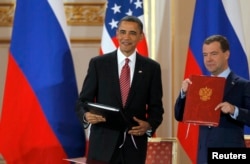Russia said Monday it has met the nuclear arsenal limits of a key arms control treaty, but it raised some issues with how the United States has sought to comply with the 2010 accord.
In a separate statement, the Russian Foreign Ministry also scathingly criticized a different U.S. nuclear review, saying it could lower the threshold for using nuclear weapons.
The New START treaty signed in 2010 restricts the U.S. and Russia each to 1,550 deployed strategic nuclear warheads on a maximum of 700 deployed intercontinental ballistic missiles and strategic bombers. The deadline to verify both countries' compliance was Monday.
The Russian Foreign Ministry said it now has 527 deployed intercontinental ballistic missiles and strategic bombers and 1,444 strategic nuclear warheads. The U.S. reported it has been in compliance with the limits since August.
While acknowledging the U.S. statement on meeting the treaty caps, Russia voiced concern about the U.S. reconfiguring some submarines and bombers to carry conventional weapons. The foreign ministry said it does not have a way to confirm the reconfigured hardware was rendered incapable of carrying nuclear weapons.
The ministry added that the U.S. also "arbitrarily converted" some missile launch facilities designated for training purposes, a use it said wasn't envisaged by the treaty.
"The Russian federation confirms its adherence to the New START Treaty while insisting that the United States continues a constructive search for mutually acceptable solutions," to "issues that may arise between the parties under the Treaty," it said.
U.S. response
Responding to the Russian claims, the U.S. State Department insisted that "the United States is in full compliance with its Treaty obligations and is fully committed to continuing to implement New START."
The State Department added: "In order to meet the central limits of the Treaty, the United States developed and utilized conversion procedures in full compliance with its Treaty obligations," it added.
"We will continue to engage Russia in the Bilateral Consultative Commission and other diplomatic channels to work cooperatively to address technical questions and issues related to the ongoing implementation of New START," it said.
Russia-U.S. ties have remained tense over the Ukrainian conflict, the Syria war and allegations of Moscow's meddling in the 2016 U.S. presidential election.
On Friday, the Trump administration declared it will continue much of the Obama administration's nuclear weapons policy, but take a more aggressive stance toward Russia. It said Russia must be convinced it would face "unacceptably dire costs" if it were to threaten even a limited nuclear attack in Europe.
'Escalate to de-escalate'
The Pentagon-led review of the U.S. nuclear arsenal and the policies that govern it reflected the administration's view that Russian policies and actions are fraught with potential for miscalculation that could lead to an uncontrolled escalation of conflict in Europe.
It specifically pointed to a Russian doctrine known as "escalate to de-escalate," in which Moscow would use or threaten to use smaller-yield nuclear weapons in a limited, conventional conflict in Europe in the belief that doing so would compel the U.S. and NATO to back down.
The report, known as the Nuclear Posture Review, said the U.S. would modify "a small number" of existing long-range ballistic missiles carried by Trident strategic submarines to fit them with smaller-yield nuclear warheads.
"In the longer term," the administration plans to develop a nuclear-armed sea-launched cruise missile, re-establishing a weapon that existed during the Cold War but was retired in 2011 by the Obama administration.
Russia slammed the U.S. report, saying it was founded on false assumptions about Moscow's intentions and contained worrying modernization plans.
"Readiness to use nuclear weapons to prevent Russia from using its nuclear arsenal, expressed in the new Nuclear Posture Review, amounts to putting in question our right to defend ourselves against an aggression that threatens the country's survival," the Russian Foreign Ministry said in a statement released over the weekend. "We would like to hope that Washington is aware of the high level of danger when such doctrinal provisions move to the level of practical military planning."
The ministry argued that while the Russian military doctrine envisages the use of nuclear weapons to deter an aggression that threatens "the very existence of our state," Washington took a no-limits approach under which it might use nuclear weapons in "extreme circumstances" that aren't part of military operations.
"Moreover, even military scenarios are presented so ambiguously that it seems like the U.S. planners may view practically any use of military capability as a reason for delivering a nuclear strike against anyone they consider an `aggressor,"' it said.
The ministry added that the U.S. plans to develop new low-yield nuclear weapons "will greatly increase the temptation of using them, especially considering the right to a disarming first strike as set out in the new U.S. doctrine."
"Assurances that the implementation of these plans will not lower the nuclear threshold can at least be interpreted as a desire to delude the international community," it said. "It is even more frightening that the U.S. military and other national security professionals firmly believe in their ability to model conflict scenarios that involve low-yield nuclear opinions. Quite to the contrary, we believe that this dramatic lowering of the threshold conditions can provoke a nuclear missile war even in a low-intensity conflict."





